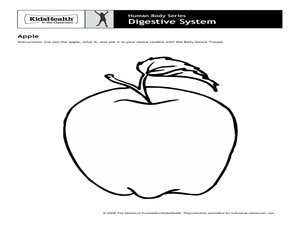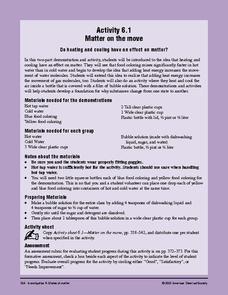Las Cumbres Observatory
Astronaut Training: Taste
Gravity isn't the only thing astronauts lose in space. Learners investigate why astronauts complain about a loss of taste while in space in a hands-on activity. They taste test foods while limiting their other senses and rate each food...
Polar Trec
Plankton Parents
Plankton are so abundant in the ocean they outweigh all of the animals in the sea. In this three day activity, groups discuss and become familiar with plankton, capture females, and look for egg production on day three.
National Wildlife Federation
Spider Sensations
Know that feeling when walking into a spider's web? Feel it from the other end! Scholars learn about the body parts of a spider and the specific spiders known as orb-weavers. Groups play a game to figure out how a spider finds its food...
Biology Junction
Water Biomes
Water covers more than 70 percent of Earth's surface. Scholars learn about both freshwater and saltwater biomes in a simple presentation. They compare and contrast the differences in oxygen levels, food sources, and sunlight to better...
Curated OER
Science: Grade 4
Building a scientific vocabulary is important for all students and this presentation provides a list of words typical to 4th grade science curriculum. Tip: Adding images to this resource will make the vocabulary more accessible to ELLs...
Curated OER
Science Unit Lesson Five
Sixth graders review how and which plants operate in terrariums. In groups, they follow instructions to make their own terrarium and place different types of plants in it. To end the lesson, they review the steps in the water cycle and...
Curated OER
Pyramid Power
Students observe human health by analyzing different food groups. In this food pyramid lesson, students utilize the web to complete an interactive food pyramid game as well as research the nutrition encyclopedia. Students discuss their...
Curated OER
redator and Prey- Food chain relationships
Young scholars s identify the different trophic levels in the food chain and understand the importance of the energy cycle. They create a class food web using index cards and yarn and play a predator/prey game.
Curated OER
Food Makes the World Go Round
Fifth graders investigate the origins of foods they eat while they consider social justice issues. In this food sources lesson, 5th graders play a game and then research food distribution, food security, and hunger in the world today....
Curated OER
Food Systems Feed the World
Students discover how getting food from farm-to-fork involves several steps and many hands. In this interactive food chain lesson, students respond to a series of questions about food distribution then work collaboratively to create a...
Curated OER
Spill Your Guts
Students practice nutrition facts. In this health and nutrition lesson, students participate in a game in which two teams compete to "spill their guts" by quickly answering factual questions pertaining to nutrition. This lesson is...
Curated OER
Watering Our Prairie Farms
After reading an article about irrigation on Canadian farms, learners participate in a discussion. They individually write an opinion paper about the surrounding issues. A lesson plan like this can be used in an earth science class when...
Curated OER
Week 8 - Sea Life
Using a magnifier, mini marine biologists examine the barbules of a bird feather. They swirl the it into a mixture of oil and water and then re-examine the feather. After the activity, discuss how the oily feathers pose a problem to sea...
Curated OER
Mouse Roulette
Students explore the food chain. To gain an understanding about the food web, students participate in a simulation where owlets are being fed by adult owls. Afterward, students examine the results of the role play to determine whether an...
Curated OER
Links in the Chain of Life
Using the prairie dog community as an example, middle school ecologists examine the food web. Pairs of learners take one species in the community and research its role in the ecosystem. They share their findings with the rest of the...
Curated OER
Changing Planet: Adaptation of Species (Birds and Butterflies)
A video about the impact of climate change on butterfly populations and a PowerPoint about butterfly and bird adaptations warm science learners up for the activity to follow. Using a variety of tools that reprsent unique styles of bird...
American Chemical Society
Defining Dissolving
Physical science investigators mix sugar and food coloring into different cups of water and cooking oil to compare how the solid and liquid behave in each. As the introduction to this unit on dissolving, it is relevant.
ARKive
Biodiversity and Evolution – Darwin’s Finches
Teens experience natural selection firsthand (or first beak) in an activity that has them act as finches foraging for food. Using different household items to act as different beak styles, your little finches will collect as much food...
Curated OER
Human Body Series - Digestive System
With articles entitled, "What's Puke?" and "What is a Fart?" this digestive system lesson is sure to be a gas! Elementary anatomists do a belly dance to illustrate how food moves through the digestive system and then design a board game...
American Chemical Society
Matter on the Move
Start this mini unit on matter out by demonstrating how food coloring behaves when placed in cold and in hot water. Then have the class experiment with warm water and soap film. Pupils will learn that an increase in thermal energy also...
Curated OER
Water Pollution
Fifth graders study the impact of human activity on water quality and on the ecosystems of Earth. After a discussion on the various ways that water can be polluted, groups of youngsters get together to figure out the best way to clean a...
Curated OER
Where Did They Come From?
Give science learners nine questions about the biogeography of hydrothermal vents and turn them loose to research this fascinating habitat. Working in cooperative groups, they prepare a report that addresses each of the questions. A...
Curated OER
Cooking with the Sun
Young scholars explore using energy from the sun for heating and cooking as they build and compare the performance of four solar cooker designs. This excellent two-day instructional activity has groups of students build and test a...
Curated OER
The Water Cycle
Fifth graders explore the major components of the water cycle. They pay close attention to evaporation, condensation, and precipitation. A water cycle kit is set up in the classroom, which learners observe for a couple of days before the...

























